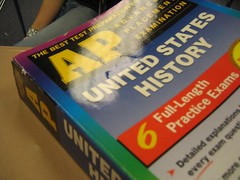
- Image by antimony funk! via Flickr
Jon Loeb ’11
Staff Writer
It’s first period on a Wednesday, and only half of Mrs. McNamee’s AP Language class is present.
No, there is no bug moving around and kids aren’t sleeping in, instead many of her students are taking the AP Calculus exam.
This is one of the many days where McNamee’s class was cut to a fraction of its normal size due to AP testing, and the class has their own AP test to prepare for, no more or less important than the others.
“We couldn’t really do much because if we did anything big or important then half the class would miss it, so we just did some more essay practice, but we didn’t get to work on the multiple choice,” Dustin Lowman ’11 said.
McNamee’s class is only one of the many classes experiencing serious dips in attendance. Many classes are having these dips because students are allowed to miss their entire school day when they have an AP test. Bill Wilkes’s AP Calculus classes are also having similar issues.
“There is definitely low attendance. Everyday during the AP weeks there are at least 20 percent-30 percent of the students absent.”
AP Literature teacher Christine Richardson described the AP weeks as frustrating. “A lot of kids take multiple APs, which definitely makes it hard to produce a meaningful lesson.”
Other classes, though, are more fortunate and have early APs, so low attendance during most of the AP week is not that big of an issue.
One of these classes is Eric Mongirdas’s AP U.S. History class. Mongirdas plans for the low attendance and A.P. U.S. History’s early A.P. time made it not much of an issue.
“Its something that I budget for at the beginning of the year; its not much of an issue.”
Many teachers, like Mongirdas, have gone through the AP weeks many times and are used to the process, so they can budget and plan for it. It is now assumed that students will miss the entire school day during AP week, which makes it difficult for anyone to even try to change the system.
According to Richardson, “It would be hard to change it, that’s the way it is, there is no other way of going about it.”
Other teachers like Wilkes assume that their students will come back to class and don’t take it for granted that they’ll be heading for home immediately after testing is finished.
“If they have another AP test to prepare for, its assumed that they’ll come back to class if they want to be prepared.”
Changing to a system where students would be forced to immediately report to class would obviously not be popular among the student body. Lowman, who’s taking the AP Language exam, plans to go home immediately after.
“I’m sure there would be backlash if they tried to make us stay at school, people really like that about the AP tests.”














































